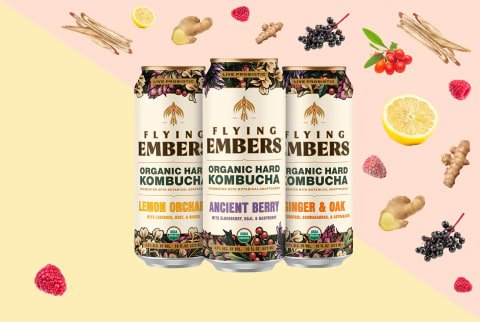Advertisement
What Is Hard Kombucha & Does It Have Any Health Benefits?



This is my predicament come summer happy hour season: I want something less sugary than a cocktail, more substantial than a hard seltzer, less potent than wine (I'm becoming more of a lightweight with each passing year), and less glutenous and bloating than beer. Who's with me? Typically, my strict criteria steers me toward options like a nice dry hard cider, which is great. But lately, I've also had my eye on one of the latest boozy trends to hit the market—hard kombucha—and I've been eager to get my hands on a bottle.
What is hard kombucha?
First off, you might be wondering, what is hard kombucha anyway? Doesn't all kombucha have trace amounts of alcohol? Here's the deal: Most kombucha you'd find at any Whole Foods is made by mixing sweetened black or green tea with a symbiotic colony of bacteria and yeast (SCOBY) and allowing it to ferment. The SCOBY converts the sugar into CO2 and alcohol, creating that delightfully tart-sweet, fizzy end product we all know and love. Kombucha can naturally reach up to around 3 percent ABV, but anything sold in stores as non-alcoholic will be less than 0.5 percent ABV.
Hard kombucha takes things up a notch. After the initial fermentation, most companies add additional sugar and another strain of yeast in a secondary fermentation process that converts that sugar into more alcohol. Of course, depending on the brand, the specific formula can vary significantly, with some infusing their boozy booch with fruits, spices, and even adaptogenic herbs.
They're not super widespread right now, but you'll probably start seeing hard kombuchas at your local liquor stores and trendy bars (think: the ones with the great craft beer selections) soon. A few brands are available at some online alcohol retailers, too.
What exactly does it taste like?
I was able to get my hands on a few bottles of Flying Embers Hard Kombucha, an organic kombucha brand that launched late last year and just announced it would be expanding distribution across the country. They offer three flavors—Ginger & Oak, Lemon Orchard, and Ancient Berry—all of which are certified organic and made via a natural fermentation process.
Even cooler: The kombucha is fermented with an adaptogenic base of ginger, turmeric, ashwagandha, and astragalus. This brand also clocks in at 4.5 percent ABV, about that of a light beer, which is just my style.
The verdict? These are good. They tasted like a kombucha with a more complex, funky flavor and subtle boozy notes—similar to a fruity dry cider or tangy wild ale. The most surprising part? A sticker slapped on the front of the bottle proudly proclaimed "0 g sugar," which means the sugar was essentially all fermented away to boost the alcohol content. You'd never know it, though—the combo of fruits and herbs and organic acids (which provide a nice tang) create big flavor and the illusion of sweetness.
But does boozy booch have any health benefits?
"I think these are a great choice for people looking for an alternative," says Frances Largeman-Roth, RDN, nutrition and wellness expert and author of Eating in Color. Like regular, non-alcoholic kombucha, the health benefits may depend on the brand, though.
Some will likely have more sugar than others, for example, and out of the handful of brands on the market now, the ABV can also be "all over the map," says Largeman-Roth. "Some are as low as 3%, and others are more like 7 to 8% and quite boozy." So, depending on the level of buzz you're looking for, it's something to consider.
But does the alcohol kill the probiotics, you might ask? "I don't believe it affects the probiotics," says Largeman-Roth. "I researched this last year when I was looking into a hard kombucha brand. The thing you need to keep in mind is that it has to stay in refrigeration for the probiotics to be live and effective. You can't leave a six-pack out on the counter like you can with beer."
As for other perks, it's hard to say, but they're likely similar to those of regular kombucha, like polyphenol compounds and glucaric acid, which provides important support for detoxification. Gut health affects everything in your body, so balancing it, and understanding yours is key to a good quality of life.
Bottom line: Hard kombucha is super tasty, relatively light, and a fun way to mix things up. The potential benefits are probably relatively minimal, though, so don't expect them to cancel out the alcohol—you can still get a hangover!

Why Nutrition Is Key To Changing Your Relationship With Alcohol
Brooke Scheller, DCN, CNS

Why Alcohol Sabotages Your Gut Health & How To Get Back On Track
Brooke Scheller, DCN, CNS

Why Nutrition Is Key To Changing Your Relationship With Alcohol
Brooke Scheller, DCN, CNS

Why Alcohol Sabotages Your Gut Health & How To Get Back On Track
Brooke Scheller, DCN, CNS

Why Nutrition Is Key To Changing Your Relationship With Alcohol
Brooke Scheller, DCN, CNS

Why Alcohol Sabotages Your Gut Health & How To Get Back On Track
Brooke Scheller, DCN, CNS

Why Nutrition Is Key To Changing Your Relationship With Alcohol
Brooke Scheller, DCN, CNS

Why Alcohol Sabotages Your Gut Health & How To Get Back On Track
Brooke Scheller, DCN, CNS















